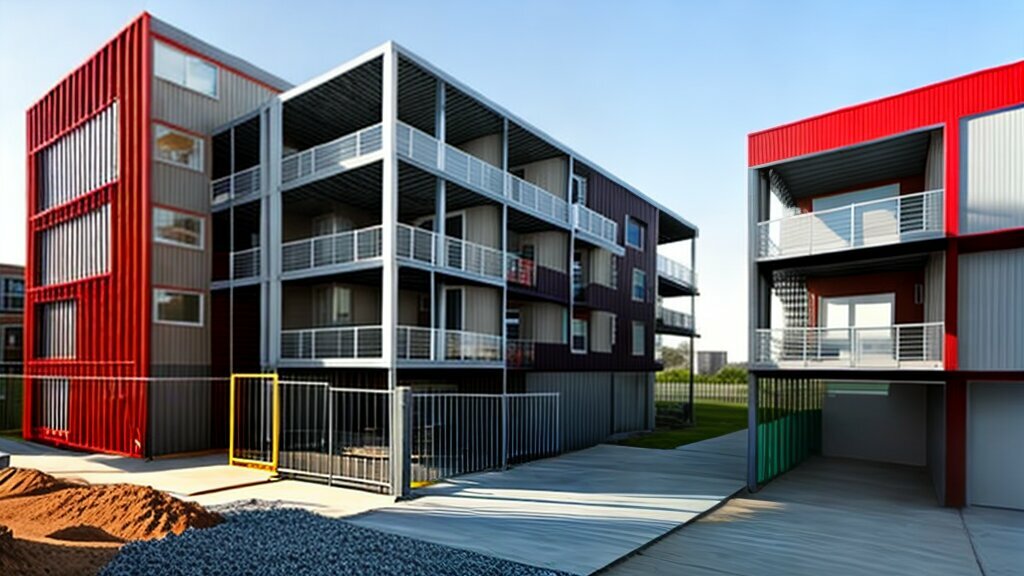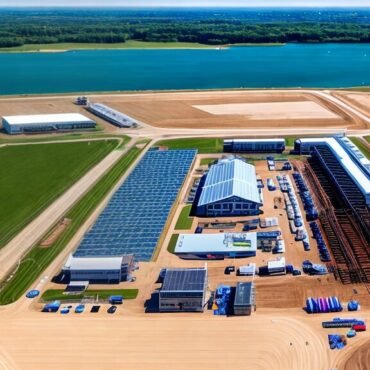With the emergence of new technologies, the construction industry is experiencing a significant transformation. From improving productivity to reducing costs, technology is revolutionizing the way we build, enhancing the quality of life for construction workers, and improving efficiency. In this article, we will explore the latest advancements in construction technology and how they are reshaping the industry as we know it.
Key Takeaways
- Technology is transforming the construction industry, improving productivity, and reducing costs.
- The latest technological advancements in the construction industry include the use of drones, 3D printing, robotics, and other emerging technologies.
- Digital transformation is reshaping the construction industry, improving collaboration, real-time data sharing, and streamlining project management.
- Technology is improving various aspects of construction, such as design, planning, and implementation, improving safety, sustainability, and overall project outcomes.
- Construction industry innovation is being driven by startups, research institutions, and collaboration networks.
- The latest construction technology trends include modular construction, green building practices, autonomous equipment, and virtual reality.
- Technology is improving construction project management, enhancing efficiency, transparency, and decision-making in construction management processes.
Construction Technology Advancements
The construction industry is undergoing significant changes as technology advancements continue to revolutionize the way things are done. The use of emerging technologies like drones, 3D printing, and robotics has dramatically improved productivity, accuracy, and cost-efficiency in construction.
Drones
Drones have rapidly become popular in the construction industry. They are now regularly used to survey sites, map out terrain, and monitor construction progress. With drones, it’s easier to identify potential safety hazards, which can be corrected before they become real problems. Drones can also be fitted with high-resolution cameras to capture images and footage of construction sites from various angles, making it easier for builders to get a complete view of the project. This allows for proper monitoring of construction progress, saving both time and money.
3D Printing
Another technology revolutionizing the construction industry is 3D printing. With 3D printing, contractors can create entire buildings with the push of a button. This technology is faster, more efficient, and less expensive than traditional construction methods. 3D printing also reduces waste, as only the materials required for the specific job are used.

Robotics
Robotics is another technology that is transforming the construction industry. Robots are being used to perform tasks like bricklaying, welding, and painting. They can work faster than human workers, and they can work non-stop around the clock without getting tired. Robotics also reduces the risk of accidents on construction sites, as robots are not affected by hazards like extreme temperatures or heights.
Thanks to these new technologies, the construction industry is becoming more efficient, productive, and safe. Contractors are now able to take on more projects while reducing costs and errors. With the continued development of new technologies, the construction industry is set to see further advancements in the years to come.
Digital Transformation in Construction
The construction industry has been undergoing a digital transformation over the past few years. The adoption of digital tools and technologies has enabled stakeholders to collaborate more effectively and streamline project management processes.
One major technology driving digital transformation in construction is Building Information Modeling (BIM). BIM is a digital representation of the physical and functional characteristics of a building or infrastructure. It allows stakeholders to collaborate on a project in real-time, improving communication, and decision-making.
Cloud computing has also been a game-changer for the construction industry. The cloud allows stakeholders to share data and collaborate in real-time from anywhere in the world. This has led to more efficient and cost-effective project management processes.
|
BIM |
Cloud Computing |
| Impact |
Improved collaboration and decision-making |
Efficient and cost-effective project management |
| Example |
The Sagrada Familia in Barcelona was designed and constructed using BIM technology. |
The PCL Construction company uses cloud-based project management software to improve project efficiency and communication. |
Another digital tool transforming the construction industry is artificial intelligence (AI). AI can be used to analyze large amounts of data and make predictions about project outcomes. This can help stakeholders make more informed decisions about project timelines and budgets.
Overall, the digital transformation of the construction industry has resulted in more streamlined project management, improved collaboration, and increased efficiency. As the industry continues to evolve, it will be exciting to see what technologies emerge to further advance the sector.

Impact of Technology on Construction
Technology has had a significant impact on various aspects of the construction industry, improving safety, sustainability, and overall project outcomes. For example, Building Information Modeling (BIM) has revolutionized the design and planning phase, enabling real-time visualization of construction projects. This has led to enhanced collaboration and reduced errors during the construction process.
Moreover, technology has made construction sites safer by reducing the risk of accidents. Wearable technology, such as smart helmets and safety vests, can detect potential hazards and alert workers to take precautionary measures. This has significantly decreased the number of accidents and injuries on construction sites.
Technology has also improved sustainability in construction. Building materials are now being developed with advanced technology, such as 3D printing, resulting in reduced waste. Additionally, energy-efficient technology, such as solar panels and smart lighting systems, is becoming increasingly popular in the industry, reducing the carbon footprint of buildings.
Overall, the impact of technology on the construction industry has been positive, and it has the potential to continue improving project outcomes and advancing the field in the future.
“Technology is just a tool. In terms of getting the kids working together and motivating them, the teacher is the most important.” – Bill Gates

Construction Industry Innovation
As the construction industry continues to evolve, innovation is becoming a key differentiator for businesses that want to stay competitive. Startups, research institutions, and collaboration networks are driving innovation and pushing the boundaries of what’s possible in construction.
One area of innovation that has been gaining momentum is the use of augmented reality (AR) and virtual reality (VR) in construction. AR and VR allow workers to visualize designs and plans in 3D, making it easier to identify potential issues and improve project outcomes. For example, using AR, workers can overlay digital plans onto physical spaces, allowing them to easily see how different elements will fit together before construction even begins.
Another area of innovation is the use of the Internet of Things (IoT) in construction. IoT devices can be used to monitor construction sites and equipment in real-time, providing valuable data on everything from worker safety to equipment performance. This data can be used to optimize processes and improve productivity, while also enhancing safety measures on construction sites.
Finally, green building practices are also becoming more prevalent in the construction industry. Building materials and designs that prioritize sustainability are being developed and implemented to reduce the environmental impact of construction projects. For example, modular construction is gaining popularity as a way to reduce waste and increase efficiency on construction sites.

These are just a few examples of the innovative solutions and practices emerging in the construction industry. By embracing these technologies and practices, businesses can improve efficiency, reduce costs, and deliver better outcomes for their clients.
Construction Technology Trends
The construction industry is evolving at an unprecedented pace, and technology is one of the key drivers of this transformation. Emerging trends in construction technology are opening up new opportunities for improving efficiency, sustainability, and safety in the sector. Here are some of the top trends that are shaping the future of construction:
Modular Construction
Modular construction involves building structures off-site in a controlled environment and then assembling them on-site. This approach reduces construction time, waste, and costs, making it an attractive option for many builders. Modular construction also allows for greater flexibility in design and customization, making it an excellent choice for high-rise buildings, hotels, and residential projects.

Green Building Practices
The green building movement is gaining momentum as builders seek to create more sustainable and eco-friendly projects. From using recycled materials to implementing renewable energy sources, green building practices are making a significant impact on the construction industry. Builders who embrace green building practices can reduce their environmental footprint, lower operating costs, and attract environmentally conscious clients.
Autonomous Equipment
Autonomous equipment, such as drones and robots, are increasingly being used in construction projects. These machines can perform tasks that are dangerous, time-consuming, or repetitive, freeing up workers to focus on more complex tasks. Autonomous equipment can also improve accuracy and efficiency, reducing the risk of errors and delays on construction sites.
Virtual Reality
Virtual reality (VR) technology is transforming the way architects and builders design and visualize buildings. VR technology enables builders to create detailed 3D models of buildings, allowing them to identify potential design issues and make changes before construction begins. VR technology also allows builders to create immersive experiences, giving clients a realistic experience of what their project will look like before it is built.
These trends are just a few examples of how technology is reshaping the construction industry. By embracing these technological advancements, builders can stay ahead of the curve and deliver better outcomes for their clients.
Technology in Construction Management
Construction management is a complex process that involves numerous stakeholders and processes. The use of technology has transformed the construction management landscape by enhancing efficiency, transparency, and decision-making.
Project management software is a key tool used in construction management. These software solutions help construction managers to plan, organize, and manage resources and budgets for a construction project. The software provides real-time data on project progress, budget, and risks, enabling managers to make informed decisions. Additionally, scheduling tools help to manage timelines and resources, reducing delays and improving efficiency.
Data analytics is another technology that is revolutionizing construction management. With data analytics tools, construction managers can analyze large amounts of data to identify patterns, trends, and insights. This information helps to optimize processes, improve performance, and reduce costs.

Furthermore, digital tools are enhancing transparency and collaboration in construction management. Cloud-based systems such as Building Information Modeling (BIM) enable collaboration and real-time data sharing among different stakeholders. This helps to reduce errors, eliminates redundancies and enhances overall productivity and efficiency.
The use of technology in construction management has significantly improved project outcomes, reducing costs, and improving safety and sustainability. However, it is crucial to ensure only reliable and accredited the technology is used in construction management. The right technology, when effectively deployed, can provide a competitive advantage in the construction industry.
Conclusion
In conclusion, technology is revolutionizing the construction industry in unprecedented ways. From construction technology advancements like drones, 3D printing, and robotics to digital transformation tools such as Building Information Modeling (BIM) and cloud computing, the industry is experiencing significant changes. These changes have impacted various aspects of construction, including design, planning, and implementation.
New construction industry innovations, such as augmented reality, Internet of Things (IoT), and modular construction, are also emerging, creating new opportunities and further reshaping the industry. As construction becomes more complex and challenging, technology is providing solutions to enhance efficiency, transparency, and decision-making in construction management processes.
It is important for stakeholders in the construction industry to embrace technology to stay competitive in the ever-evolving construction landscape. By harnessing the power of technology, construction professionals can improve productivity, accuracy, and cost-efficiency, while also enhancing safety, sustainability, and overall project outcomes.
FAQ
Q: How is technology revolutionizing the construction industry?
A: Technology is transforming the construction industry by improving productivity, accuracy, and cost-efficiency. It enables the use of drones, 3D printing, robotics, and other emerging technologies to streamline construction processes.
Q: What is digital transformation in construction?
A: Digital transformation in construction involves the use of Building Information Modeling (BIM), cloud computing, and other digital tools to enhance collaboration, real-time data sharing, and project management.
Q: How does technology impact construction?
A: Technology has a significant impact on construction, improving safety, sustainability, and overall project outcomes. It enhances various aspects such as design, planning, and implementation, leading to better results.
Q: What are some innovative practices in the construction industry?
A: The construction industry is embracing innovation through startups, research institutions, and collaboration networks. Augmented reality, Internet of Things (IoT), and other disruptive technologies are driving innovation in the sector.
Q: What are the latest trends in construction technology?
A: The latest trends in construction technology include modular construction, green building practices, autonomous equipment, and virtual reality. These trends are reshaping the industry and creating new opportunities.
Q: How is technology improving construction project management?
A: Technology is enhancing construction project management through the use of project management software, scheduling tools, and data analytics. It improves efficiency, transparency, and decision-making in construction management processes.
























Construction Technology ConFEX on April 22, 2024
Fantastic article on the impact of construction technology! The integration of technology in the construction industry has truly been a game-changer, from improving project management and communication to enhancing safety and sustainability.